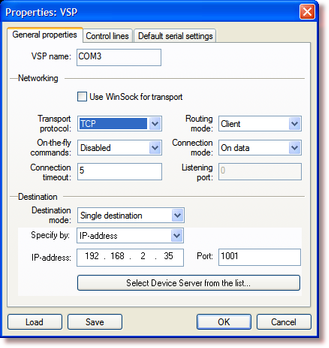The VSP Properties window contains the following tabs:

| • | General properties tab (shown on the screenshot) provides a set of "main" controls that guide VSP operation. For more information select the topic from the list belowJA. |
| • | Control lines tab offers additional options for control line inputs CTS, DSR, and DCD. You can choose to receive input line status updates from the DS, "fix" these inputs at high or low, or "connect" CTS to RTS and DSR to DTR. |
| • | Default serial settings tab exists purely for compatibility with regular COM ports. Under Windows, each COM port has a set of default parameters associated with it, and so does VSP. These parameters do not affect operation of the VSP in any way. |
The G eneral Properties tab (shown above) has the following areas and controls:
| • | On-the-fly commands drop-down box disables or enables the generation of on-the-fly commands, used to adjust the serial port parameters on the DS as needed by the application software (that uses the VSP). There is also a choice of how the on-the-fly commands will be sent when enabled (as out-of-band or inband commands). |
| • | Connection timeout parameter defines after how many minutes of inactivity (no data transmitted across the data connection between the VSP and the DS) the current data connection will be aborted. |
| • | Routing mode drop-down box defines whether the VSP will accept incoming connections (passive opens) and/or establish outgoing connections (perform active opens). |
| • | Connection mode drop-down box defines when the VSP will attempt to establish an outgoing connection to the destination: right after the VSP is opened by the application or when the application sends the first data. |
| • | Listening port parameter defines the listening port that will be associated with this VSP. The VSP will be accepting incoming connections (passive opens) on this port (when allowed by the routing mode). |
| • | Specify by drop-down box defines how the address of the destination is to be specified - by IP address, by MAC address or by DNS hostname. |
